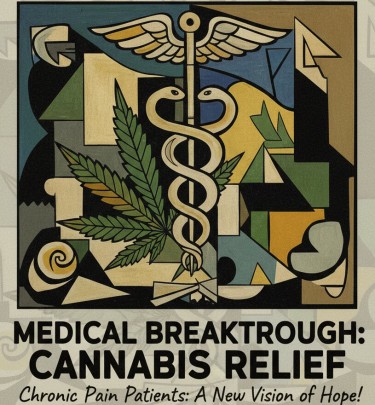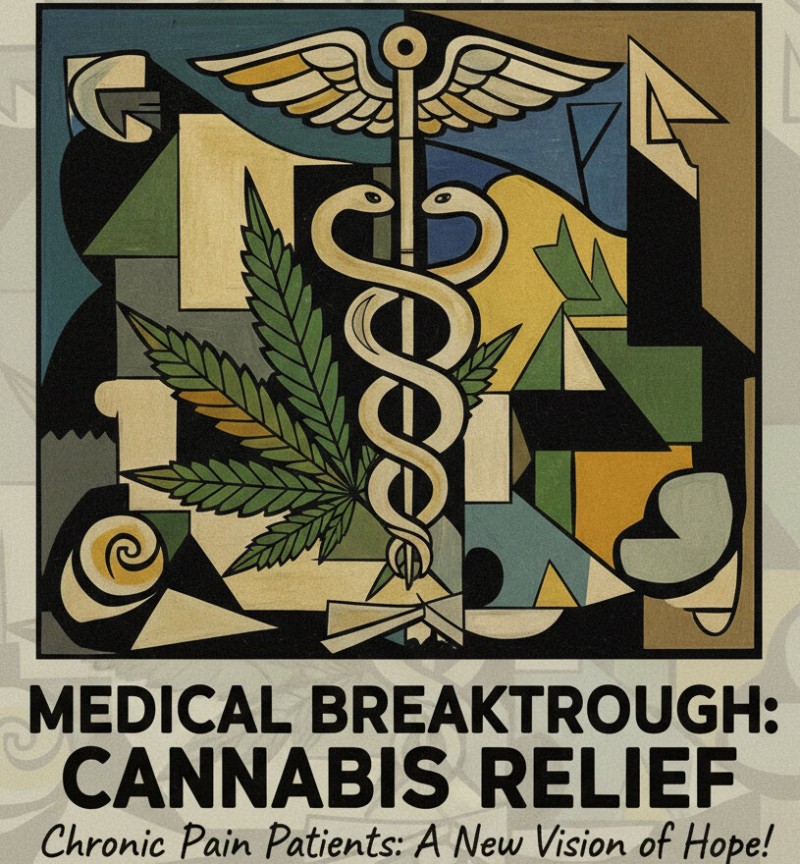
After decades of anecdotal evidence, industry hype, and low-quality studies that couldn't definitively prove cannabis helps with pain, we finally have what researchers are calling "the first high-quality evidence that something in the cannabis plant can treat pain."
A phase 3 clinical trial – the gold standard for medical research – published in Nature Medicine has demonstrated that a specifically developed cannabis extract called VER-01 provides significant relief for chronic lower back pain. This isn't some dispensary marketing claim or patient testimonial. This is rigorous, placebo-controlled science involving over 800 participants showing measurable, sustained pain reduction.
Let that sink in for a moment. Chronic lower back pain is the leading cause of disability worldwide, affecting more than half a billion people according to the World Health Organization. Current treatment options are limited to common painkillers like ibuprofen (which can cause serious side effects with long-term use) or opioids (which are highly addictive and have killed hundreds of thousands of Americans). And now we have evidence that a cannabis extract can provide meaningful relief without the addiction risk or dangerous side effects.
The study showed participants taking VER-01 reported a 1.9-point reduction in pain on a 10-point scale after 12 weeks, compared to just 0.6 points for placebo. After six months, that improvement increased to 2.9 points. They also reported better sleep, improved physical function, and enhanced quality of life.
Andrew Moore, a former pain researcher at Oxford University not involved in the study, called it "terrific" and "about as good as it gets," emphasizing that this represents breakthrough evidence for cannabis as medicine.
But before dispensaries start plastering this study on their walls and claiming all cannabis treats pain, we need to be clear about what this actually means. This wasn't just any marijuana – it was a specifically developed, standardized extract designed to meet pharmaceutical standards. As one researcher put it, comparing regular marijuana to VER-01 is like comparing hazelnuts to Nutella: they share a similar basis, but they're not comparable.
Let's break down what this study actually found, what it means for the millions suffering from chronic pain, and why this is exactly why cannabis needs to be descheduled and properly researched.
What the Study Actually Found: Details Matter
The trial, led by Professor Matthias Karst from Hannover Medical School in Germany, enrolled over 800 people suffering from chronic lower back pain who hadn't found relief from non-opioid medications. This is important – these weren't people with minor aches. These were patients for whom standard treatments had failed, leaving them facing the choice between living with debilitating pain or turning to opioids.
Participants were randomly assigned to receive either VER-01 or a placebo for 12 weeks. The double-blind, placebo-controlled design means neither participants nor researchers knew who was getting what – eliminating bias and expectation effects that have plagued previous cannabis pain research.
VER-01 contains 2.5 milligrams of THC per dose – the main psychoactive component in marijuana. But critically, participants reported no feelings of being "high" during the trial. This dosing appears to hit a therapeutic sweet spot where pain relief occurs without intoxication.
The results were statistically significant and clinically meaningful. After 12 weeks, the VER-01 group reported pain reductions of 1.9 points on a 10-point scale compared to 0.6 for placebo. That 1.3-point difference might not sound dramatic, but in chronic pain research, improvements of 1-2 points are considered clinically significant – meaning they represent real, meaningful changes in patients' daily lives.
More impressively, improvements continued over time. By six months, VER-01 users reported 2.9-point reductions in pain. This sustained benefit without tolerance development is crucial – many pain medications become less effective over time, requiring dose increases that bring increased side effects.
Beyond pain scores, participants reported improved sleep quality, better physical function, and enhanced overall quality of life. Anyone who's experienced chronic pain knows that it affects everything – your ability to work, exercise, socialize, and enjoy life. The fact that this extract improved these secondary outcomes suggests real-world benefits beyond just numerical pain reductions.
Side effects were mild and temporary: dizziness, sleepiness, dry mouth, and some nausea, all of which decreased over time. Critically, the study found no evidence of addiction or serious adverse events. This safety profile stands in stark contrast to opioids, which carry substantial risks of addiction, overdose, and death.
Professor Karst emphasized that VER-01 was specifically developed to obtain approval by medical authorities for prescription use. It's not just cannabis – it's a standardized pharmaceutical product with consistent potency, purity, and quality controls that allow doctors to prescribe it safely and confidently.
This standardization is what previous cannabis pain research has lacked. When studies use variable cannabis products with inconsistent THC levels, unknown contaminants, and different ratios of cannabinoids and terpenes, results become impossible to replicate or interpret. VER-01 solves this problem by providing a consistent product that meets pharmaceutical standards.
The researchers were careful to note that this evidence applies specifically to VER-01, not to all cannabis products. As Karst emphasized, this is not "proof that all cannabis/CBD products would be helpful in the same way." Different strains, different preparations, different dosing – all of these factors matter enormously for medical applications.
The Chronic Pain Market: What's at Stake
To understand the significance of this breakthrough, we need to examine the massive market for chronic pain treatment and what's at stake for pharmaceutical companies.
Chronic lower back pain affects more than 540 million people globally according to WHO estimates. In the United States alone, approximately 65 million people report recent episodes of back pain, with 16 million adults experiencing persistent or chronic back pain that limits everyday activities. This isn't just a health crisis – it's an economic catastrophe costing the U.S. economy an estimated $635 billion annually in medical costs and lost productivity.
The pharmaceutical market for pain management is enormous. The global pain management therapeutics market was valued at approximately $83 billion in 2023 and is projected to reach over $115 billion by 2030. Within this market, treatments for chronic back pain represent a substantial segment, with non-steroidal anti-inflammatory drugs (NSAIDs) like ibuprofen and prescription opioids dominating sales.
Opioid pain medications alone generated roughly $24 billion in annual sales before the opioid crisis prompted prescribing restrictions. Even with recent declines, opioid prescriptions for chronic pain remain common despite their well-documented risks. Meanwhile, NSAIDs generate billions in sales annually, despite risks of gastrointestinal bleeding, cardiovascular events, and kidney damage with long-term use.
Here's where things get interesting for pharmaceutical companies: if VER-01 or similar cannabis-based medicines gain regulatory approval and clinical acceptance, they could capture a significant portion of this market. Conservative estimates suggest that even capturing 10-15% of the chronic pain medication market could represent $8-12 billion in annual sales globally.
But the threat to existing pharmaceutical revenues extends beyond just direct competition. Cannabis-based pain medications could fundamentally reshape prescribing patterns. Doctors currently face a dilemma: prescribe NSAIDs with their long-term risks, or prescribe opioids with their addiction potential. A cannabis-based alternative that provides meaningful pain relief without these serious risks could become a first-line treatment, displacing billions in existing drug sales.
The market dynamics explain why pharmaceutical companies have historically opposed cannabis research and legalization. It's not primarily about medical concerns – it's about protecting revenue streams from medications that cannabis could potentially replace.
Consider the numbers: Pfizer's Celebrex (celecoxib), a COX-2 inhibitor used for chronic pain, generated over $2 billion in annual sales at its peak. Purdue Pharma's OxyContin generated over $3 billion annually before its role in the opioid epidemic became undeniable. Multiple other pain medications generate hundreds of millions to billions in annual revenue.
If cannabis-based medications prove as effective as this study suggests, with better safety profiles than existing options, market disruption becomes inevitable. Insurance companies would favor cheaper, safer alternatives. Doctors would prefer prescribing medications with lower risk profiles. Patients would choose treatments with fewer side effects and no addiction risk.
This explains the decades-long resistance to cannabis research from pharmaceutical industry lobbying groups. It's not about protecting public health – it's about protecting market share. Every legitimate study showing cannabis can effectively treat pain represents a threat to established revenue streams worth billions annually.
Why Descheduling Can't Wait
This Nature Medicine study represents exactly why cannabis must be completely descheduled and opened to unrestricted medical research. We've just discovered that a standardized cannabis extract can provide meaningful relief for one of the most common and debilitating medical conditions affecting humanity, but only after decades of prohibition prevented this research from happening.
How many other medical applications are we missing because cannabis remains locked in Schedule I? How many people have suffered unnecessarily because research has been systematically obstructed? How many billions have been wasted on opioid addiction treatment and overdose deaths that might have been prevented if cannabis-based pain medications had been developed decades ago?
The VER-01 trial shows what becomes possible when researchers can actually study cannabis properly using pharmaceutical standards and rigorous methodology. But this single trial required extraordinary effort to overcome regulatory barriers that shouldn't exist for a plant with proven medical applications and remarkably low risk profiles.
Descheduling would unleash a flood of legitimate research. Universities could study cannabis without DEA restrictions. Pharmaceutical companies could develop standardized medications. Doctors could prescribe with confidence based on clinical evidence rather than anecdotes and patient experimentation.
The chronic pain market alone represents tens of billions in potential medical applications. Add in PTSD, anxiety disorders, epilepsy, cancer treatment side effects, and numerous other conditions where preliminary evidence suggests cannabis might help, and we're talking about transformative medical potential that's been deliberately suppressed for political reasons.
This study is proof that prohibition has been holding back medicine. It's time to deschedule cannabis and let science do its work.







